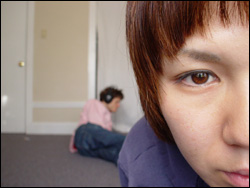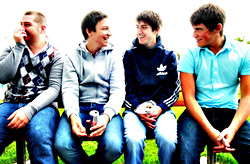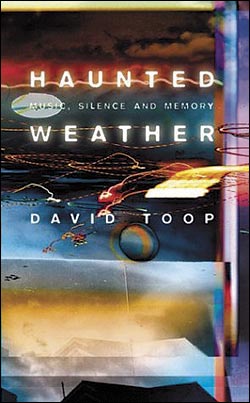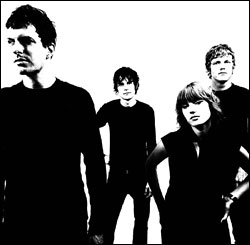GREG SAUNIER TALKS like he plays. It’s not that the Deerhoof drummer speaks all that percussively. Nor does he use his feetat least not to the point that it’s audible over the phone. But Saunier’s conversation, like his playing, is simultaneously focused, full of unexpected bursts, and not the least bit lacking in grand flourishes. “Everybody has an imagination,” he enthuses from his home in San Francisco. “And if everybody were realizing their imaginations, then everybody’s quote-unquote art would be as unique or strange or different or whatever as our music often gets called. I think it takes a much bigger effort to force a completely unique imagination, as everyone’s is, to match what’s perceived as normal.”
There’s little on Apple O’ (Kill Rock Stars), Deerhoof’s sixth and latest album, to suggest that the band is straining toward anything even vaguely resembling normalcy. Granted, it’s a pop album for the most partone that draws as much from Abbey Road-era Beatles as it does the classical music Saunier loves, or the last great era of San Francisco-based “rock.” If you find yourself thinking of Jefferson Airplane or the Grateful Dead, splash some cold water on your face, slap it a few times, and hope you wake up a little closer to the present. We’re talking the highly eccentric ’80s heyday of the Ralph Records stable: Tuxedomoon, the Residents, the Art Bears. Like the Ralphsters of yore, Deerhoof twist and turn the basic elements of pop like circus balloons until they come up with the sorts of chimerical entities that would be right at home in a grown-up version of Teletubbies.
The band’s naïflike qualities derive in no small part from the contributions of bassist Satomi Matsuzaki, whose vocal delivery inspired one casual listener of my acquaintance to observe, “She sounds like a really talented 6-year-old having the time of her life when she thinks no one is listening.” True, Matsuzaki’s flutelike pipes and hyperminimalist lyrics do lend kid-show sheen to Deerhoof’s sonic aroma. But even when they crank the Tinky Winky knob up to 12, as on “Panda Panda Panda,” the band still manages to plant enough beanstalk seeds in the mix to come out smelling like Stravinsky. As Matsuzaki coos “Pan-da pan-da pan-da/Pan-da pan”capped with the occasional “China,” bamboo,” “bye-bye,” or “I like,” just to keep the scansion friskyshe, Saunier (who doubles as her mate), and guitarists Chris Cohen and John Dieterich lurch around the melody with an angularity that recalls Television in their “Little Johnny Jewel” daysexcept that Deerhoof incorporate a grand fanfare and a double-time interlude into the 2:39 mini-epic. By song’s end, you can’t help but picture the furry subject itself, lumbering through its habitat on some urgent errand undoubtedly related to food or sex.
The sonic impressionism of “Panda Panda Panda” is typical of Deerhoof’s Saturday-morning flavor. “We’ve never been very good at writing songs by jamming,” Saunier observes, “or even writing by playing. What generally works out best for us is if a song starts with an idea, which makes it harder to work with than something that’s more habitual. Usually what happens is that we try for months and months, then give up. Then, finally, the idea presents the idea for realizing itself and something clicks, which is the most rewarding part of the process. Nothing pleases meand amazes me more than to know that I can have an idea that, sooner or later, is experienced by someone in Seattle or Minneapolis or wherever.”
In spite of its title, “Sealed With a Kiss” is the song on Apple O’ that best illustrates Saunier’s point about ideas. Once again, the track revolves around Matsuzaki’s voice, as well as a riff that, were it not so grand and stately, might have come straight out of the Sonics’ songbook. The track, soft and sparse at first, builds primarily by adding electronic elements and conceptual hiccups, as well as by passing the central riff from organ to what sounds like a big baritone horn, until it culminates in a massive, swelling drone and a small bassy reprise of the riff. While the game of pass-the-theme that takes place in “Sealed With a Kiss” is fairly unusual in rock, it’s hardly unique to Deerhoof. In fact, the gambit recalls the sort of standard device in classical music that George Martin employed a few times on later Beatles albumsright down to the larger-than-life reprise at the beginning of “Adam and Eve Connection,” the penultimate track on Apple O’. So what? The trick got used a few times some 30-odd years ago; that doesn’t make it seem any less fresh now. Plus, you can rest assured that Deerhoof won’t be repeating it in any sort of recognizable form. The band fears redundancy far more than fear itself.
“I think it’s great that there’s a real underground now for the first time in ages,” Saunier notes. “What worries me is that as the underground gets co-opted by the overground, which has started already, it’ll start to get all showbiz. Look at the White Stripes. Two years ago, they were an underground band. Now, a lot of people are like, ‘Yuck, White Stripes,’ just because they’ve gotten so schticky, so predictable. I have nothing against trends, but any time a band feels compelled to repeat the same gesture again and again, whether it’s smashing their equipment or wearing mismatched socks, they run the risk of losing whatever made them unique and interesting in the first place. That’s what we want to avoid at all costs.”
Deerhoof play with Cobra High and Caustic Resin at Chop Suey, 9 p.m., Fri., Aug. 29. $8 adv.








